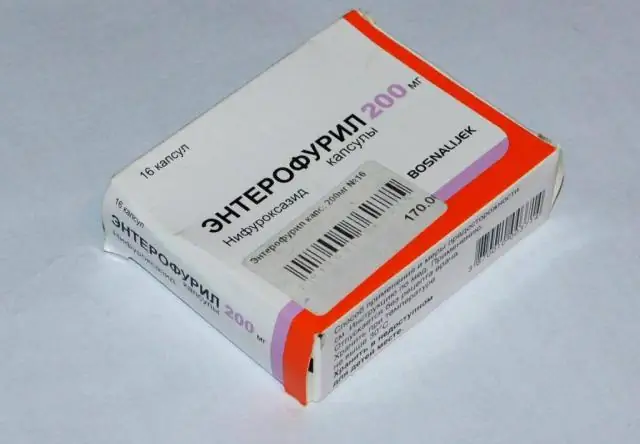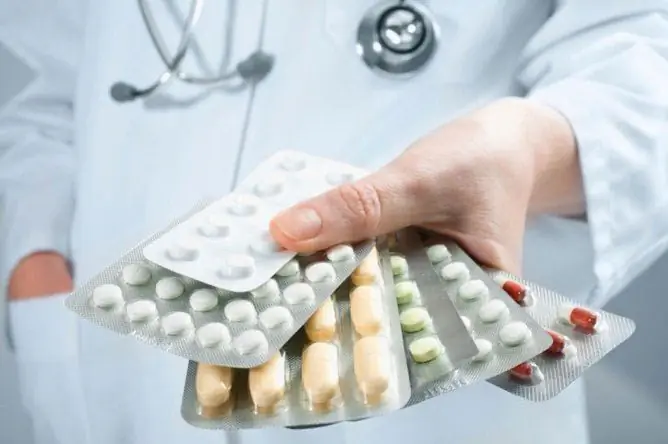- Author Rachel Wainwright wainwright@abchealthonline.com.
- Public 2023-12-15 07:39.
- Last modified 2025-11-02 20:14.
Ginsana
Ginsana: instructions for use and reviews
- 1. Release form and composition
- 2. Pharmacological properties
- 3. Indications for use
- 4. Contraindications
- 5. Method of application and dosage
- 6. Side effects
- 7. Overdose
- 8. Special instructions
- 9. Application during pregnancy and lactation
- 10. Use in childhood
- 11. For violations of liver function
- 12. Use in the elderly
- 13. Drug interactions
- 14. Analogs
- 15. Terms and conditions of storage
- 16. Terms of dispensing from pharmacies
- 17. Reviews
- 18. Price in pharmacies
Latin name: Ginsana
ATX code: A13A
Active ingredient: ginseng (Panax ginseng)
Manufacturer: Swiss Caps (Switzerland)
Description and photo update: 2020-09-07

Ginsana is a general tonic herbal preparation.
Release form and composition
The drug is produced in the form of capsules: soft, gelatinous, opaque, oblong, brown, with a smooth shiny surface and with a seam running along the entire length; the contents of the capsules are a pale brown homogeneous mass with a barely perceptible specific smell (4 pcs. in a blister, in a bag of aluminum-paper foil 1 blister; 10 pcs. in a blister, in a cardboard box 3 blisters and instructions for the use of Ginsana).
Composition for 1 capsule:
- active substance: dry standardized extract of ginseng roots (G115) 1 content of native extract - 43.5 mg, which is equivalent to 4 mg (± 10%) of the total of ginsenosides 100 mg;
- additional components: soy lecithin, rapeseed oil, lecithin, wax mixture 2, ethyl vanillin;
- capsule shell: glycerol 85%, gelatin, anidrisorb 85 / 70.85% 3, ethyl vanillin; dyes - iron oxides black and red (E172).
Note
1 producing plant - Panax ginseng S. A. Meueg of the family Araliaceae; extract (G115) in an amount of 100 mg contains native ginseng extract - 43.5 mg and inactive components in the form of lactose monohydrate - 54.5 mg [European Pharmacopoeia (EP)] and colloidal silicon dioxide - 2 mg (EP); extractant - alcohol 40%, the ratio of plant raw materials to extract - 5 ÷ 1.
2 the wax mixture contains hydrogenated soybean oil, yellow beeswax, partially hydrogenated soybean oil.
3 anidrisorb 85/70, 85% contains D-sorbitol, 1,4 - sorbitan, mannitol, sorbitan, hydrogenated oligo- and polysaccharides.
Pharmacological properties
Pharmacodynamics
Ginsana is a phytopreparation, the pharmacological properties of which are due to the action of biologically active substances. Ginseng extract contains saponin glycosides-ginsenosides (panaxosides).
The complex of active ingredients of the drug has a biostimulating, tonic and metabolic effect. The drug, by stimulating the central nervous system (CNS), reduces general weakness, drowsiness, and excessive fatigue. It enhances physical and mental performance, demonstrates hypertensive and hypoglycemic effects.
Pharmacokinetics
Ginseng root extract (G115) is a complex concentrated extract containing over 200 different substances with a combined effect. In view of the fact that the activity of a general tonic drug cannot completely depend on the influence of only any one compound, the implementation of pharmacokinetic studies of the entire herbal remedy is problematic.
Ginsenosides are the main active components of ginseng extract, absorbed in the gastrointestinal tract (GIT), 0.2-1.5% of metabolites of the active components of the drug are excreted in the urine.
Indications for use
The herbal remedy Ginsana is recommended for use to enhance physical and mental performance in conditions such as loss of concentration, exhaustion, fatigue, general weakening of the body, as well as during the recovery period after illness.
Contraindications
Absolute:
- increased excitability;
- sleep disorders;
- arterial hypertension;
- convulsive states, epilepsy;
- bleeding;
- chronic liver disease;
- febrile syndrome in acute infectious lesions;
- age up to 12 years;
- hypersensitivity to any component of the drug, as well as a history of allergies to peanuts and soy.
Since one of the ingredients in Ginsana is lactose, it is not recommended to take the drug in the presence of congenital galactosemia, congenital lactase deficiency or glucose / galactose malabsorption syndrome.
Ginsana, instructions for use: method and dosage
Ginsan capsules should be taken orally with meals with water.
Recommended doses and frequency of administration:
- adults: 2 capsules 1 time / day during breakfast or 1 capsule 2 times / day - during breakfast and lunch; in case of severe stress conditions at the beginning of the course of treatment, the dose can be increased to 4 capsules per day;
- adolescents over 12 years old: 1 capsule per day.
The course of therapy is 1-2 months. On the recommendation of the attending physician, a second course is possible.
Side effects
During the period of treatment with a phytopreparation, the following undesirable phenomena may occur: agitation, nervousness, allergic reactions, hypoglycemia, increased blood pressure (BP); in rare cases - headache, sleep disturbances, nosebleeds, tachycardia; transient and moderate gastrointestinal disorders - stomach pain, nausea, vomiting, diarrhea.
In case of aggravation of the severity of any of the above effects or the development of any other adverse reactions, you should consult your doctor.
Overdose
Symptoms of Ginsana overdose include insomnia and increased blood pressure.
Therapy for intoxication is prescribed symptomatic.
special instructions
To avoid sleep problems, do not take the drug in the afternoon.
The greatest therapeutic effect of a general tonic agent is recorded when it is used in the autumn and winter periods.
After the completion of Ginsana's reception, no symptoms were recorded, and the development of a withdrawal syndrome is not expected.
If you miss taking 1 or more doses of the drug, you need to continue using it as usual. Do not double the dose in order to compensate for the missed dose.
When disposing of unused product, special precautions are not required.
Influence on the ability to drive vehicles and complex mechanisms
Ginsana does not adversely affect the ability to drive vehicles and operate complex equipment.
Application during pregnancy and lactation
Pregnant and lactating women should not take Ginsan capsules.
Pediatric use
The drug is contraindicated in children under 12 years of age.
For violations of liver function
Patients with chronic liver diseases are not prescribed drug therapy.
Use in the elderly
There are no special instructions for the use of the drug in the elderly.
Drug interactions
- drugs that suppress the central nervous system (sedatives, barbiturates, neuroleptics, tranquilizers): Ginsana refers to the physiological antagonists of these drugs;
- analeptics and stimulants (including phenamine, caffeine, camphor): the therapeutic effect of these drugs is enhanced;
- hypoglycemic drugs, anticoagulants: their effect increases.
Analogs
The analogues of Ginsana are Ginseng tincture, Gerimax Ginseng, Herbion ginseng, Ginseng with vitamin C, Doppelgerz Ginseng, etc.
Terms and conditions of storage
Store out of reach of children, protected from moisture, at a temperature not exceeding 25 ° C.
The shelf life is 3 years.
Terms of dispensing from pharmacies
Available without a prescription.
Reviews about Ginsan
Reviews about Ginsan are overwhelmingly positive. Patients and specialists note that the drug after a course of administration provides an increase in physical and mental activity, eliminates increased fatigue, drowsiness, improves concentration of attention, and also restores strength during the period of convalescence.
No complaints about unwanted effects.
Price for Ginsana in pharmacies
The exact price of Ginsana is unknown, since the product is currently not available in pharmacies.
The cost of an analogue of the drug, Herbion ginseng, capsules 350 mg, can be 450-500 rubles. per package containing 30 pcs.

Maria Kulkes Medical journalist About the author
Education: First Moscow State Medical University named after I. M. Sechenov, specialty "General Medicine".
Information about the drug is generalized, provided for informational purposes only and does not replace the official instructions. Self-medication is hazardous to health!






